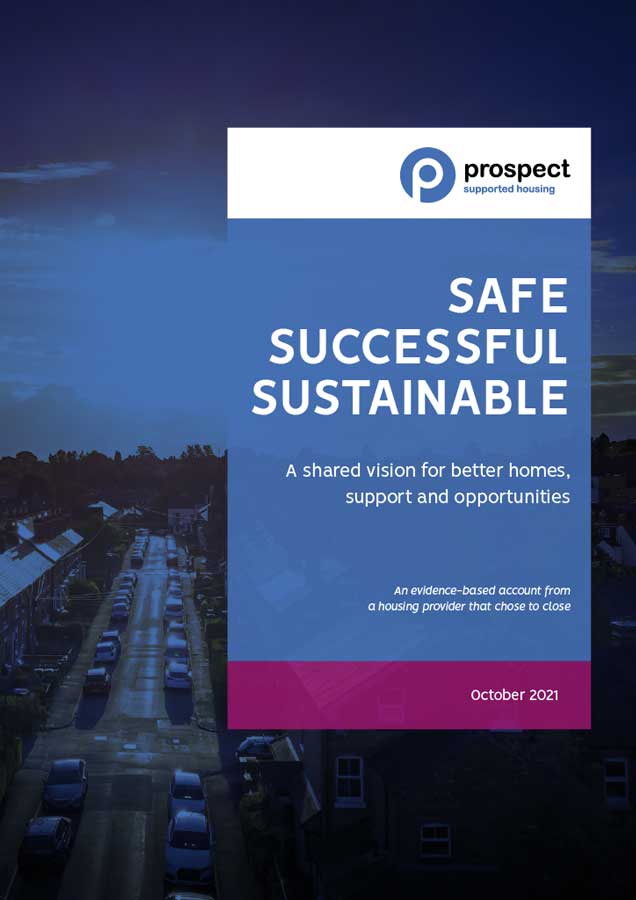Exempt accommodation
Lessons learned from a housing provider that chose to close

STRATEGY
Image: Istock

Owen Ingram
Chair, Prospect Housing
In 2020, our board made the difficult but necessary decision to close. Prospect was established as a Registered Provider in 2013, but ultimately our model of providing leased homes and associated care became unviable.
Despite being cognisant of what was required to achieve improvement and having a plan in place to achieve it, Prospect was unable to affect change. The legacy issues of the organisation’s lease arrangements prevented us from being able to sufficiently influence some of the property owners and managing agents from which housing was leased. Consequently, Prospect was unable to improve oversight, assurance and control over much of the housing stock it managed (see box: The Prospect story). Sadly, we are not alone.
Lease-based lessons
Our decision was clear, but the future of lease-based, exempt sector accommodation remains less so. To help the sector change and learn from our experience, we’ve launched a report detailing our history and the results of a FOI report. Our main call to action – which is in progress – is for a parliamentary Select Committee hearing into this issue.
Headlines from the report, which launched at an All-Party Parliamentary Group with Crisis, include:
- There are at least 106,000 people living in exempt accommodation nationally
- An estimated £816 million has been spent as a minimum on exempt accommodation in the last financial year alone, and potentially closer to £1 billion
Calls for action
Legislative and funding calls for action from Prospect include:
- Closing a number of loopholes in funding and regulatory regimes, preventing some from taking advantage of vulnerable homeless people in need of housing
- The introduction of new housing benefit guidance to support local authorities to make more informed choices about the use of exempt funding
- Registered Providers taking greater ownership of the relationship with residents, and taking control of all the key touch points throughout their tenure
- Doing more to support residents into permanent accommodation and give them the springboard for independent living, preventing exempt accommodation from becoming a poverty trap
- Ensuring that the boards of lease-based, exempt accommodation providers are clear on the obligations they have, that they ensure their members have the requisite skills to manage complex businesses and that their conduct is always exemplary
- Revising funding streams to ensure that property and care costs are paid for appropriately and deliver better value for money, while also helping lease-based, exempt accommodation providers to have viable businesses models
We think that a range of stakeholders, working collectively, can help address the issues that impacted on Prospect – and which we know are affecting others. As a result it is possible to offer higher-quality homes, improved services and better prospects for vulnerable people living in exempt accommodation.
Most organisations and individuals providing supported housing (particularly in the commissioned sector) are dedicated and diligent, often going above and beyond what is required of them to deliver for their residents. We want to see a stable and sustainable platform from which they can continue to do this vital work and make even more of a difference in the lives of people who need their help.
The Prospect story
Prospect Housing was established as a Registered Provider in 2013. Its mission was to provide high-quality accommodation and support for vulnerable adults at risk of homelessness in the Birmingham area.
Prospect’s clients included young people, care leavers, offenders, people with substance misuse issues, mental health, learning disabilities and refugees.
Prospect’s model of providing leased homes and associated care for those it housed would ultimately become unviable.
For reasons discussed in this report, the organisation was unable to deliver a long-term viable business plan while maintaining compliance with regulatory standards and housing benefit regulations.
Alongside this, Prospect was impacted by inadequate oversight and risk management, insufficiently robust governance arrangements and unfavourable lease agreements.
All of these were identified as factors in the Regulator of Social Housing’s governance downgrade of the organisation in May 2020.
These issues were not unique to Prospect however, and several organisations operating a lease-based, exempt accommodation business model have also received regulatory notices from the regulator.
“Prospect was impacted by inadequate oversight and risk management, insufficiently robust governance arrangements and unfavourable lease agreements.”
Despite being aware of what was required to achieve improvement and having a plan in place to achieve it, Prospect was unable to affect change.
In 2020, the board commissioned a full options appraisal to try to establish a sustainable future for the organisation.
After exploring all the options fully, the board made the difficult but necessary decision for Prospect to cease trading and consider other arrangements for the organisation’s 1,500 residents.
Despite the best efforts of all involved, there was no way of retuning the business to regulatory compliance, while simultaneously ensuring its viability.



